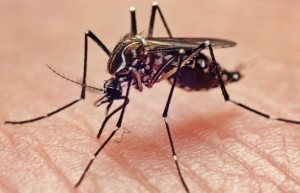Zika's coming. Are we ready?
With the arrival of warm weather, health officials in the U.S. say it is not a matter of if but when we will see a widespread outbreak of the mosquito-borne Zika virus. Are we ready for it? No, we are not.
Stateline, an initiative of Pew Charitable Trusts, recently reported that budget cuts at the state and local level have left health departments seriously understaffed and potentially unable to deal with a serious outbreak of the Zika virus. The virus has been linked to microcephaly and other forms of severe brain damage in infants, as well as the incapacitating Guillain-Barre syndrome, which can cause paralysis and death.
To understand the potential widespread effects of Zika, we need only look as far as Puerto Rico, which (although Congress sometimes forgets) is part of the United States. When the Zika virus expands and spreads through the summer and fall months, health officials say, 700,000 residents could be infected – one fifth of the island’s population.
So what’s the problem? As is so often the case, a lack of funding.
Since the Great Recession began in 2007, spending on public health has decreased precipitously at the state and local level. Between 2008 and 2014, overall state spending on public health declined by $1.3 billion, according to the Trust for America’s Health and the Robert Wood Johnson Foundation.
Local health departments have lost 52,000 staff positions as a result of hiring freezes and budget cuts, Stateline reported. And a 2014report by the Council of State and Territorial Epidemiologists found that state and local health departments are less prepared to track and contain infections carried by mosquitoes than at any time since the early 2000s, when they ramped up to deal with the first outbreak of the West Nile virus.
According to Stateline, between 2004 and 2012, there was a 41 percent drop in the number of staff working at least half time in mosquito surveillance (to detect whether they are carrying disease). Seven states no longer conduct mosquito surveillance whatsoever.
James Blumenstock, speaking for the State and Territorial Epidemiologists, said states face a Catch-22: “Funding has been reduced for public-health activities at the same time that public-health threats are coming more and more vigorously and with more intensity,” he toldStateline.
The problem, he said, is that Zika could strike even as local health departments are attempting to juggle other public health challenges. “State and local departments today are looking to their staff and deploying them to deal with Zika,” he said. “But if you send an epidemiologist to deal with Zika full time, that’s eight hours a day less that he’s doing food-borne surveillance, or HIV surveillance or flu surveillance.”
Like the crisis in Flint, Michigan, the Zika virus has a potentially disparate impact that is class- and race-based. Lower-income people are less likely to use or even have air conditioning and quality window screens in the summer months, an effective shield against mosquitoes. Southern states with humid climates, with disproportionately poor populations, will be especially susceptible to the mosquito-borne disease.
So what are our elected officials doing about the threat Zika poses, especially to low-income Americans? In his budget, President Obama proposed $1.9 billion in emergency spending to combat the spread of the virus. Congress is considering an emergency spending bill of its own, but the money may not be sufficient to address the potential crisis, and in any case, it could come too late to avoid a major public health crisis that could be only a few short months away.
This post was originally published on the Coalition on Human Needs' blog, Voices for Human Needs. Receive similar articles in your inbox by subscribing today, and follow CHN on Facebookand Twitter.



The views and opinions expressed in this post are those of the author(s) and do not necessarily reflect those of MomsRising.org.
MomsRising.org strongly encourages our readers to post comments in response to blog posts. We value diversity of opinions and perspectives. Our goals for this space are to be educational, thought-provoking, and respectful. So we actively moderate comments and we reserve the right to edit or remove comments that undermine these goals. Thanks!